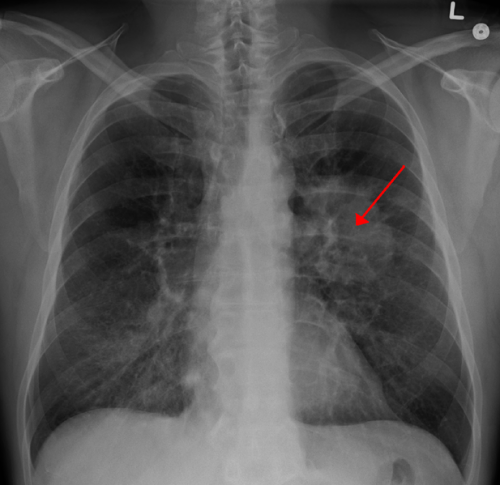Lung cancer clues found in downstream pathway

Despite the promise of the gene KRAS as a target for treating lung cancer, finding effective therapies has been challenging. Now researchers are traveling down the pathway to find what makes KRAS cancerous.
A new study from researchers at the University of Michigan Comprehensive Cancer Center sheds light on the KRAS pathway with a potential target that might have more success at stopping lung cancer growth.
The researchers found that a protein called FADD picks up a phosphate for a specific amino acid when KRAS is active, a process called phosphorylation. They engineered mouse models of lung cancer. In one set, they turned on KRAS and deleted FADD from the mouse's genome. In another set, they turned on KRAS and left FADD to work normally. The mice with deleted FADD did not get tumors, despite having active KRAS.
Phosphorylation happens to FADD through a protein called casein kinase 1-alpha, or CK1-alpha. So the researchers took the KRAS mouse model and deleted CK1-alpha from the genome. FADD was left alone. They found that in the absence of CK1-alpha, FADD never gets phosphorylated and the mice never get tumors despite having activated KRAS.
"We don't have effective ways of targeting KRAS directly, so we have to go downstream to attack. This study shows that casein kinase 1-alpha is a bona fide target for treatment of KRAS-mutated lung cancer," says corresponding study author Alnawaz Rehemtulla, Ph.D., Ruth Tuttle Freeman Research Professor of radiation oncology and radiology and co-director of the Center for Molecular Imaging at the University of Michigan Medical School.
Up to a quarter of lung cancers involve mutations in KRAS. No inhibitors of KRAS are currently available.
"Figuring out how KRAS causes cells to divide is important and gives us potential avenues for blocking the downstream activity and inhibiting lung tumor growth," Rehemtulla says.
The study is published on the cover of the Jan. 27 issue of Science Signaling.
A CK1-alpha inhibitor was used in this study and is currently being developed in laboratory settings. More work is needed before any potential clinical testing can begin.
More information: Science Signaling, Vol. 8, No. 361, Jan. 27, 2015, DOI: 10.1126/scisignal.2005607















